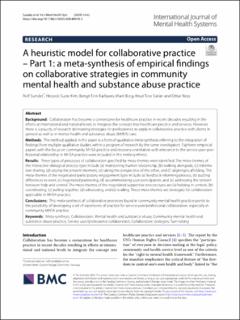| dc.contributor.author | Sundet, Rolf | |
| dc.contributor.author | Kim, Hesook Suzie | |
| dc.contributor.author | Karlsson, Bengt Eirik | |
| dc.contributor.author | Borg, Marit | |
| dc.contributor.author | Sælør, Knut Tore | |
| dc.contributor.author | Ness, Ottar | |
| dc.date.accessioned | 2021-04-26T10:50:04Z | |
| dc.date.available | 2021-04-26T10:50:04Z | |
| dc.date.created | 2020-05-14T06:31:54Z | |
| dc.date.issued | 2020 | |
| dc.identifier.citation | Sundet, R., Kim, H. S., Karlsson, B. E., Borg, M., Sælør, K. T., & Ness, O. (2020). A heuristic model for collaborative practice–Part 1: a meta-synthesis of empirical findings on collaborative strategies in community mental health and substance abuse practice. International Journal of Mental Health Systems, 14, 42. | en_US |
| dc.identifier.issn | 1752-4458 | |
| dc.identifier.uri | https://hdl.handle.net/11250/2739545 | |
| dc.description.abstract | Background: Collaboration has become a cornerstone for healthcare practice in recent decades resulting in the efforts at international and national levels to integrate the concept into healthcare practice and services. However, there is a paucity of research delineating strategies for professionals to apply in collaborative practice with clients in general as well as in mental health and substance abuse (MHSA) care.
Methods: The method applied in this paper is a form of qualitative meta-synthesis referring to the integration of findings from multiple qualitative studies within a program of research by the same investigators. Eighteen empirical papers with the focus on community MHSA practice and recovery-orientation with relevance to the service user–professional relationship in MHSA practice were included in this meta-synthesis.
Results: Three types of processes of collaboration specified by meta-themes were identified. The meta-themes of the interactive-dialogical process type include (a) maintaining human relationship, (b) walking alongside, (c) information sharing, (d) seizing the present moment, (e) taking the perspective of the other, and (f ) aligning/scaffolding. The meta-themes of the negotiated-participatory engagement type include (a) feedback-informing process, (b) putting differences to work, (c) negotiated partnering, (d) accommodating user participation, and (e) addressing the tension between help and control. The meta-themes of the negotiated supportive process type are (a) helping in context, (b) coordinating, (c) pulling together, (d) advocating, and (e) availing. These meta-themes are strategies for collaboration applicable in MHSA practice.
Conclusions: This meta-synthesis of collaborative processes found in community mental health practice points to the possibility of developing a set of repertoires of practice for service user/professional collaboration, especially in community MHSA practice. | en_US |
| dc.language.iso | eng | en_US |
| dc.rights | Navngivelse 4.0 Internasjonal | * |
| dc.rights.uri | http://creativecommons.org/licenses/by/4.0/deed.no | * |
| dc.title | A heuristic model for collaborative practice – Part 1: A meta-synthesis of empirical findings on collaborative strategies in community mental health and substance abuse practice | en_US |
| dc.type | Peer reviewed | en_US |
| dc.type | Journal article | en_US |
| dc.description.version | publishedVersion | en_US |
| dc.rights.holder | © The Author(s) 2020. | en_US |
| dc.source.volume | 14 | en_US |
| dc.source.journal | International Journal of Mental Health Systems | en_US |
| dc.identifier.doi | https://doi.org/10.1186/s13033-020-00376-5 | |
| dc.identifier.cristin | 1810893 | |
| dc.source.articlenumber | 42 | en_US |
| cristin.ispublished | true | |
| cristin.fulltext | original | |
| cristin.qualitycode | 1 | |

